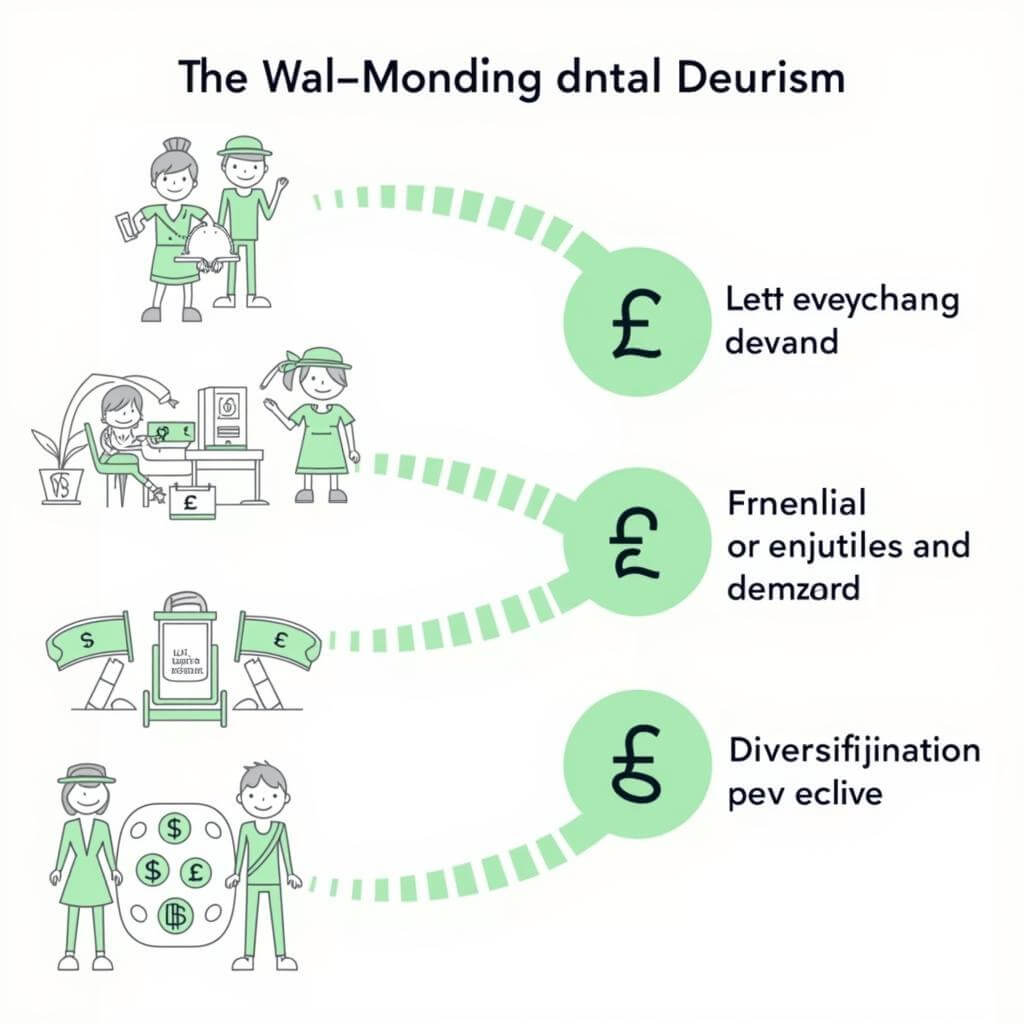International tourism and its effects on currency demand is a topic that has appeared in IELTS Writing Task 2 essays with moderate frequency over the past few years. Given the growing importance of global tourism and its economic implications, it’s likely that this theme will continue to be relevant in future IELTS exams. Let’s explore a sample question and analyze high-scoring responses to help you prepare for this type of essay.
How does global tourism impact local economies is a closely related topic that often intersects with currency demand issues in IELTS essays. Understanding these connections can help you develop more comprehensive and insightful responses.
Sample Question and Analysis
Let’s examine a question that reflects the type of prompt you might encounter in the IELTS Writing Task 2:
Some people believe that the increased demand for foreign currency due to international tourism can have negative effects on the economy of tourist destinations. To what extent do you agree or disagree with this statement?
Question Analysis:
- Topic: The impact of international tourism on currency demand and its potential negative effects on the economy.
- Task: You need to express your opinion on the statement and provide reasons to support your view.
- Key points to consider:
- The relationship between tourism and foreign currency demand
- Potential negative economic effects of increased foreign currency demand
- Possible positive aspects of tourism-related currency inflows
- The overall impact on the local economy of tourist destinations
Band 8+ Sample Essay
Here’s a sample essay that would likely score in the Band 8-9 range:
International tourism has become a significant driver of economic activity in many countries, often leading to increased demand for foreign currencies. While some argue that this phenomenon can negatively impact the economy of tourist destinations, I largely disagree with this view. In this essay, I will explain why I believe the economic benefits of tourism-related currency demand generally outweigh any potential drawbacks.
Firstly, the influx of foreign currency through tourism can strengthen a country’s foreign exchange reserves. This increased liquidity can enhance a nation’s ability to engage in international trade and manage its external debt obligations more effectively. For instance, countries like Thailand and Indonesia have leveraged their tourism sectors to bolster their foreign currency reserves, providing a buffer against economic shocks and improving their overall financial stability.
Secondly, the demand for local currency by tourists can lead to currency appreciation, which, contrary to popular belief, is not always detrimental. A stronger currency can make imports cheaper, potentially reducing inflation and benefiting consumers. Moreover, it can incentivize local businesses to improve efficiency and competitiveness in the global market. Japan’s experience in the 1980s demonstrated how a strong yen, partly driven by tourism, encouraged companies to innovate and expand globally.
However, it is important to acknowledge that excessive reliance on tourism-driven currency inflows can pose risks. Overexposure to fluctuations in global travel patterns or economic downturns in source countries can lead to volatility in currency markets. This was evident during the COVID-19 pandemic when many tourism-dependent economies faced severe economic challenges due to sudden drops in foreign currency inflows.
To mitigate these risks, governments and policymakers should focus on diversifying their economies while leveraging the benefits of tourism. This can include investing tourism revenues in other sectors, developing domestic industries, and implementing prudent fiscal and monetary policies to manage currency fluctuations effectively.
In conclusion, while the increased demand for foreign currency due to international tourism can present challenges, I believe its overall impact on the economy of tourist destinations is largely positive. The key lies in balanced economic management and leveraging tourism’s benefits to foster sustainable, long-term growth across various sectors.
The impact of inflation on tourism industries is another crucial aspect to consider when discussing the economic effects of tourism, as it can influence currency values and overall economic stability in tourist destinations.
(Word count: 379)
Essay Analysis:
This essay would likely receive a Band 8 or 9 score for the following reasons:
-
Task Response (Band 8-9):
- Clearly addresses all parts of the task with a well-developed response
- Presents a clear position throughout the essay
- Fully extends and supports main ideas with relevant examples
-
Coherence and Cohesion (Band 8-9):
- Logically organizes information and ideas with clear progression throughout
- Uses a range of cohesive devices appropriately
- Presents a clear central topic within each paragraph
-
Lexical Resource (Band 8-9):
- Uses a wide range of vocabulary with very natural and sophisticated control
- Rare minor errors in word choice or spelling
- Demonstrates precise use of topic-specific terms
-
Grammatical Range and Accuracy (Band 8-9):
- Uses a wide range of structures with full flexibility and accuracy
- Rare minor errors
- Demonstrates a high level of grammatical control
 Impact of International Tourism on Currency Demand
Impact of International Tourism on Currency Demand
Band 6-7 Sample Essay
Here’s a sample essay that would likely score in the Band 6-7 range:
In recent years, international tourism has grown rapidly, leading to increased demand for foreign currencies in many tourist destinations. Some people argue that this trend can have negative effects on the local economy. While I understand this concern, I believe that the impact of tourism-related currency demand is generally more positive than negative.
One of the main benefits of increased foreign currency demand from tourism is that it can boost a country’s economy. When tourists visit a country, they spend money on hotels, restaurants, and attractions, which creates jobs and generates income for local businesses. This influx of foreign currency can help improve the country’s balance of payments and increase its foreign exchange reserves. For example, countries like Thailand and Bali have seen significant economic growth due to their thriving tourism industries.
However, it is true that there can be some negative effects. One potential issue is that increased demand for the local currency can lead to its appreciation, which might make exports more expensive and less competitive in the global market. This could potentially harm other sectors of the economy that rely on exports. Additionally, over-reliance on tourism can make a country’s economy vulnerable to external shocks, such as global economic crises or natural disasters that affect travel patterns.
Despite these potential drawbacks, I believe that the positive effects outweigh the negatives. Governments can take steps to manage the impact of tourism on their currency and economy. This might include investing in other sectors to diversify the economy, implementing policies to manage currency fluctuations, and ensuring that tourism development is sustainable and benefits local communities.
In conclusion, while there are some potential negative effects of increased foreign currency demand due to international tourism, I believe that overall, it brings more benefits than harm to the economies of tourist destinations. The key is for countries to manage tourism growth responsibly and use the benefits to support broader economic development.
(Word count: 309)
Essay Analysis:
This essay would likely receive a Band 6-7 score for the following reasons:
-
Task Response (Band 6-7):
- Addresses all parts of the task
- Presents a clear position throughout the response
- Develops main ideas but some may be unclear or lack support
-
Coherence and Cohesion (Band 6-7):
- Arranges information and ideas coherently
- Uses a range of cohesive devices but may be overused or underused
- Presents a clear central topic within each paragraph
-
Lexical Resource (Band 6-7):
- Uses an adequate range of vocabulary for the task
- Attempts to use less common vocabulary but with some inaccuracy
- Makes some errors in spelling and word formation, but they do not impede communication
-
Grammatical Range and Accuracy (Band 6-7):
- Uses a mix of simple and complex sentence forms
- Makes some errors in grammar and punctuation but they rarely reduce communication
- Shows reasonably accurate use of common grammatical structures
Key Vocabulary for IELTS Essays on Tourism and Currency Demand
-
Currency appreciation (noun): An increase in the value of one currency relative to another.
Pronunciation: /ˈkʌrənsi əˌpriːʃiˈeɪʃən/ -
Foreign exchange reserves (noun phrase): The foreign currencies held by a country’s central bank.
Pronunciation: /ˈfɒrɪn ɪksˈtʃeɪndʒ rɪˈzɜːvz/ -
Economic diversification (noun phrase): The process of a country widening the range of its income sources.
Pronunciation: /ˌiːkəˈnɒmɪk daɪˌvɜːsɪfɪˈkeɪʃən/ -
Balance of payments (noun phrase): A record of all transactions made between one country and all other countries.
Pronunciation: /ˈbæləns əv ˈpeɪmənts/ -
Influx (noun): A large number of people or things arriving at the same time.
Pronunciation: /ˈɪnflʌks/ -
Vulnerability (noun): The quality of being easily hurt or attacked.
Pronunciation: /ˌvʌlnərəˈbɪləti/ -
Fluctuation (noun): An irregular rising and falling in number or amount.
Pronunciation: /ˌflʌktʃuˈeɪʃən/ -
Sustainable development (noun phrase): Economic development conducted without depletion of natural resources.
Pronunciation: /səˈsteɪnəbl dɪˈveləpmənt/ -
Economic shock (noun phrase): An unexpected event that affects an economy, either positively or negatively.
Pronunciation: /ˌiːkəˈnɒmɪk ʃɒk/ -
Competitiveness (noun): The ability and performance of a firm, sub-sector or country to sell and supply goods and services in a given market.
Pronunciation: /kəmˈpetɪtɪvnəs/
In conclusion, mastering essays on the impact of international tourism on currency demand requires a deep understanding of economic concepts and the ability to analyze complex relationships. Practice writing essays on this topic, considering both positive and negative aspects, and using the vocabulary provided. Remember to structure your essay clearly, use relevant examples, and maintain a balanced perspective. As you prepare for your IELTS exam, consider exploring related topics and practicing with various question types to enhance your writing skills further.
For additional practice, try writing your own essay on this topic and share it in the comments section below. This active approach to learning can significantly improve your IELTS Writing Task 2 performance and prepare you for similar questions in the actual exam.


